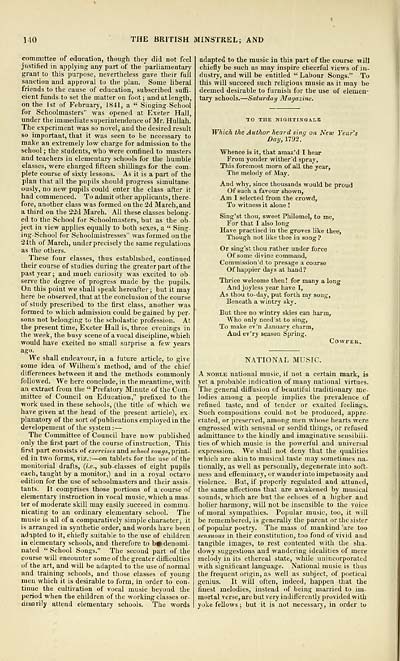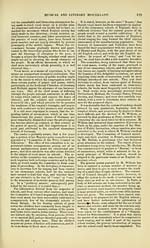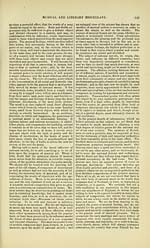Glen Collection of printed music > Printed music > British minstrel, and musical and literary miscellany
(148) Page 140
Download files
Complete book:
Individual page:
Thumbnail gallery: Grid view | List view

140
THE BRITISH MINSTREL; AND
committee of education, though they did not feel
justified in applying any part of the parliamentary
grant to this purpose, nevertheless gave their full
sanction and approval to the plan. Some liberal
friends to the cause of education, subscribed suffi-
cient funds to set the matter on foot; and at length,
on the 1st of February, 1841, a " Singing. School
for Schoolmasters" was opened at Exeter Hall,
under the immediate superintendence of Mr. HuUah.
The experiment was so novel, and the desired result
so important, that it was seen to be necessary to
make an extremely low charge for admission to the
school ; the students, who were confined to masters
and teachers in elementary schools for the humble
classes, were charged fifteen shillings for the com.
plete course of sixty lessons. As it is a part of the
plan that all the pupils should progress simultane-
ously, no new pupils could enter the class after it
had commenced. To admit other applicants, there-
fore, another class was formed on the 3d March,and
a third on the 22d March. All these classes belong-
ed to the School for Schoolmasters, but as the ob-
ject in view applies equally to both sexes, a " Sing-
ing-School for Schoolmistresses" was formed on the
24th of March, under precisely the same regulations
as the others.
These four classes, thus established, continued
their course of studies during the greater part of the
past year ; and much curiosity was excited to ob-
serve the degree of progress made by the pupils.
On this point we shall speak hereafter ; but it may
here be observed, that at the conclusion of the course
of study prescribed to the first class, another was
formed to which admission could be gained by per-
sons not belonging to the scholastic profession. At
the present time, Exeter Hall is, three evenings in
the week, the busy scene of a vocal discipline, which
would have excited no small surprise a few years
ago.
We shall endeavour, in a future article, to give
some idea of Wilhcm's method, and of the chief
diH'erences between it and the methods commonly
followed. We here conclude, in the meantime, with
an extract from the " Prefatory Minute of the Com-
mittee of Council on Education," prefixed to the
work used in these schools, (the title of which we
have given at the head of the present article), ex-
planatory of the sort ofpublications employed in the
developement of the system : —
The Committee of Council have now published
only the first part of the course of instruction. This
first part consists i>f exercises and school songs, pniii-
ed in two forms, viz.: — on tablets for the use of the
monitorial drafts, {i.e., sub-classes of eight pupils
each, taught by a monitor,) and in a royal octavo
edition for the use of schoolmasters and their assis-
tants. It comprises those portions of a course of
elementary instruction in vocal music, which a mas-
ter of moderate skill may easily succeed in commu-
nicating to an ordinary elementary school. The
music is all of a comparatively simple character; it
is arranged in synthetic order, and words have been
adapted to it, chiefly suitable to the use of children
in elementary schools, and therefore to b« denomi-
nated " School Songs." The second part of the
course will encounter some ofthe greater difficulties
of the art, and will be adapted to the use of normal
and training schools, and those classes of young
men which it is desirable to form, in order to con-
tinue the cultivation of vocal music beyond the
period when the children of the working classes or-
dinarily attend elementary schools. The words
adapted to the music in this part of the course will
chiefly be such as may inspire ciieerful views of in-
dustry, and will be entitled " Labour Songs." To
this will succeed such religious music as it may be
deemed desirable to furnish for the use of elemen-
tary schools. — Saturday Magazine.
TO THE NIGHTINOALE
Whic/i the Author heard sing on New Year's
Day, 1792.
Wlienoe is it, that amaz'd I hear
From yonder wither'd spray,
This foremost morn of all the year,
The melody of May.
And why, since thousands would be proud
Of such a favour shown,
Am I selected from the crowd.
To witness it alone !
Sing'st thou, sweet Philomel, to me,
For that I also long
Have practised in the groves like thee.
Though not like thee in song ?
Or sing'st thou rather under force
Of some divine command,
Commission'd to presage a course
Of happier days at hand ?
Thrice welcome then! for many a long
And joyless year have I,
As thou to-day, put forth my song,
Beneath a wintry sky.
But thee no wintry skies can harm.
Who only need'st to sing.
To make ev'n January charm.
And ev'ry season Spring.
COWPEK.
NATIONAL MUSIC.
A NOBLE national music, if not a certain mark, is
yet a probable indication of many national virtues.
The general difl'usion of beautiful traditionary me-
lodies among a people implies the prevalence of
refined taste, and of tender or exalted feelings.
Such compositions could not be produced, appre-
ciated, or preserved, among men whose hearts were
engrossed with sensual or sordid things, or refused
admittance to the kindly and imaginative sensibili-
ties of which music is the powerful and universal
expression. We shall not deny that the qualities
which are akin to musical taste may sometimes na-
tionally, as well as personally, degenerate into soft-
ness and effeminacy, or wander into impetuosity and
violence. But, if properly regulated and attuned,
the same aft'ections that are awakened by musical
sounds, which are but the echoes of a higher and
holier harmony, will not be insensible to the voice
of moral sympathies. Popular music, too, it will
be remembered, is generally the parent or the sister
of popular poetry. The mass of mankind are too
sensuous in their constitution, too fond of vivid and
tangible images, to rest contented with the sha-
dowy suggestions and wandering idealities of mere
melody in its ethereal state, while unincorporated
with significant language. National music is thus
the frequent origin, as well as subject, of poetical
genius. It will often, indeed, happen that the
finest melodies, instead of being married to im-
mortal verse, ai'e but very indifferently provided with
yokefellows; but it is not necessaiy, in order to
THE BRITISH MINSTREL; AND
committee of education, though they did not feel
justified in applying any part of the parliamentary
grant to this purpose, nevertheless gave their full
sanction and approval to the plan. Some liberal
friends to the cause of education, subscribed suffi-
cient funds to set the matter on foot; and at length,
on the 1st of February, 1841, a " Singing. School
for Schoolmasters" was opened at Exeter Hall,
under the immediate superintendence of Mr. HuUah.
The experiment was so novel, and the desired result
so important, that it was seen to be necessary to
make an extremely low charge for admission to the
school ; the students, who were confined to masters
and teachers in elementary schools for the humble
classes, were charged fifteen shillings for the com.
plete course of sixty lessons. As it is a part of the
plan that all the pupils should progress simultane-
ously, no new pupils could enter the class after it
had commenced. To admit other applicants, there-
fore, another class was formed on the 3d March,and
a third on the 22d March. All these classes belong-
ed to the School for Schoolmasters, but as the ob-
ject in view applies equally to both sexes, a " Sing-
ing-School for Schoolmistresses" was formed on the
24th of March, under precisely the same regulations
as the others.
These four classes, thus established, continued
their course of studies during the greater part of the
past year ; and much curiosity was excited to ob-
serve the degree of progress made by the pupils.
On this point we shall speak hereafter ; but it may
here be observed, that at the conclusion of the course
of study prescribed to the first class, another was
formed to which admission could be gained by per-
sons not belonging to the scholastic profession. At
the present time, Exeter Hall is, three evenings in
the week, the busy scene of a vocal discipline, which
would have excited no small surprise a few years
ago.
We shall endeavour, in a future article, to give
some idea of Wilhcm's method, and of the chief
diH'erences between it and the methods commonly
followed. We here conclude, in the meantime, with
an extract from the " Prefatory Minute of the Com-
mittee of Council on Education," prefixed to the
work used in these schools, (the title of which we
have given at the head of the present article), ex-
planatory of the sort ofpublications employed in the
developement of the system : —
The Committee of Council have now published
only the first part of the course of instruction. This
first part consists i>f exercises and school songs, pniii-
ed in two forms, viz.: — on tablets for the use of the
monitorial drafts, {i.e., sub-classes of eight pupils
each, taught by a monitor,) and in a royal octavo
edition for the use of schoolmasters and their assis-
tants. It comprises those portions of a course of
elementary instruction in vocal music, which a mas-
ter of moderate skill may easily succeed in commu-
nicating to an ordinary elementary school. The
music is all of a comparatively simple character; it
is arranged in synthetic order, and words have been
adapted to it, chiefly suitable to the use of children
in elementary schools, and therefore to b« denomi-
nated " School Songs." The second part of the
course will encounter some ofthe greater difficulties
of the art, and will be adapted to the use of normal
and training schools, and those classes of young
men which it is desirable to form, in order to con-
tinue the cultivation of vocal music beyond the
period when the children of the working classes or-
dinarily attend elementary schools. The words
adapted to the music in this part of the course will
chiefly be such as may inspire ciieerful views of in-
dustry, and will be entitled " Labour Songs." To
this will succeed such religious music as it may be
deemed desirable to furnish for the use of elemen-
tary schools. — Saturday Magazine.
TO THE NIGHTINOALE
Whic/i the Author heard sing on New Year's
Day, 1792.
Wlienoe is it, that amaz'd I hear
From yonder wither'd spray,
This foremost morn of all the year,
The melody of May.
And why, since thousands would be proud
Of such a favour shown,
Am I selected from the crowd.
To witness it alone !
Sing'st thou, sweet Philomel, to me,
For that I also long
Have practised in the groves like thee.
Though not like thee in song ?
Or sing'st thou rather under force
Of some divine command,
Commission'd to presage a course
Of happier days at hand ?
Thrice welcome then! for many a long
And joyless year have I,
As thou to-day, put forth my song,
Beneath a wintry sky.
But thee no wintry skies can harm.
Who only need'st to sing.
To make ev'n January charm.
And ev'ry season Spring.
COWPEK.
NATIONAL MUSIC.
A NOBLE national music, if not a certain mark, is
yet a probable indication of many national virtues.
The general difl'usion of beautiful traditionary me-
lodies among a people implies the prevalence of
refined taste, and of tender or exalted feelings.
Such compositions could not be produced, appre-
ciated, or preserved, among men whose hearts were
engrossed with sensual or sordid things, or refused
admittance to the kindly and imaginative sensibili-
ties of which music is the powerful and universal
expression. We shall not deny that the qualities
which are akin to musical taste may sometimes na-
tionally, as well as personally, degenerate into soft-
ness and effeminacy, or wander into impetuosity and
violence. But, if properly regulated and attuned,
the same aft'ections that are awakened by musical
sounds, which are but the echoes of a higher and
holier harmony, will not be insensible to the voice
of moral sympathies. Popular music, too, it will
be remembered, is generally the parent or the sister
of popular poetry. The mass of mankind are too
sensuous in their constitution, too fond of vivid and
tangible images, to rest contented with the sha-
dowy suggestions and wandering idealities of mere
melody in its ethereal state, while unincorporated
with significant language. National music is thus
the frequent origin, as well as subject, of poetical
genius. It will often, indeed, happen that the
finest melodies, instead of being married to im-
mortal verse, ai'e but very indifferently provided with
yokefellows; but it is not necessaiy, in order to
Set display mode to: Large image | Transcription
Images and transcriptions on this page, including medium image downloads, may be used under the Creative Commons Attribution 4.0 International Licence unless otherwise stated. ![]()
| Special collections of printed music > Glen Collection of printed music > Printed music > British minstrel, and musical and literary miscellany > (148) Page 140 |
|---|
| Permanent URL | https://digital.nls.uk/91436721 |
|---|
| Description | Scottish songs and music of the 18th and early 19th centuries, including music for the Highland bagpipe. These are selected items from the collection of John Glen (1833 to 1904). Also includes a few manuscripts, some treatises, and other books on the subject. |
|---|
| Description | The Glen Collection and the Inglis Collection represent mainly 18th and 19th century Scottish music, including Scottish songs. The collections of Berlioz and Verdi collected by bibliographer Cecil Hopkinson contain contemporary and later editions of the works of the two composers Berlioz and Verdi. |
|---|

